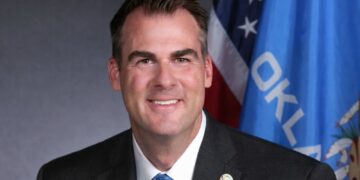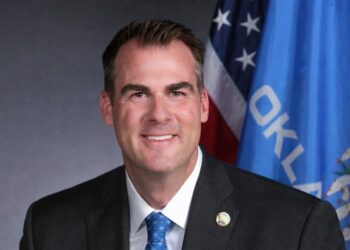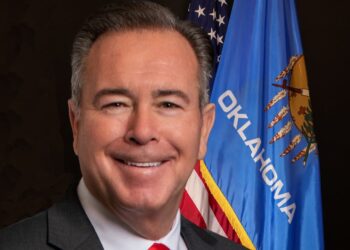OKLAHOMA CITY (OBV) – A bill at the State Capitol is getting a lot of attention for its requirements to make initiative petitions more representative of Oklahoma voters throughout the state.
Senate Bill 1027, written by Sen. David Bullard, R-Durant, and Oklahoma House of Representatives Speaker Kyle Hilbert, R-Bristow, seeks to ensure that signatures for initiative petitions or referendum petitions are gathered from a broad base of Oklahomans.
The bill requires that the signature collection process for initiative and referendum petitions be a better representation of voters across the state and not signatures consolidated in one highly populated county.
“In recent weeks, I’ve heard a lot of misleading information and outright lies being spread about my bill. Contrary to some claims, this bill does not shut down the initiative petition process or stop any Oklahomans from participating,” Bullard recently said in an editorial he wrote. “This measure simply ensures the process is more transparent and representative of the entire state. Some argue that restricting out-of-state money or requiring signatures from across the state will suppress these petitions. I vehemently disagree. If Oklahomans are going to live with the results of initiative petitions, then a diverse cross-section of Oklahomans should have a say in whether they appear on the ballot.”
An initiative petition enables voters to write statutes and constitutional amendments that appear on the state ballot when enough signatures have been collected on the petition. A referendum petition places laws previously approved by legislative bodies on the ballot. Signatures must be collected on petitions in order for the referendum to appear on the ballot, according to the Oklahoma Historical Society.
SB 1027 states that a initiative petition cannot have more than 10 percent of its total number of signatures come from a county with a population of 400,000 or more, like Oklahoma and Tulsa counties. Additionally, it also states the petition cannot have more than 4 percent of its signatures from a county with population less than 400,000.
“This bill also ensures that more Oklahomans have a say in initiative petitions by requiring signatures from multiple counties, rather than just collecting signatures in the Oklahoma City and Tulsa areas,” Bullard said. “If Oklahomans are going to have to pay with their tax dollars and their freedoms for what someone puts on the ballot, then more residents deserve to have a voice in the process.”
The bill also requires the following:
- A petition’s gist cannot contain any words which have a special meaning for a particular profession or trade or any euphemisms, words or phrases commonly known as code words.
- The gist must be neutral in its description and shall not contain any argument for or against the measure.
- The gist must state if a proposed measure will have a fiscal impact on the state.
- The gist be must be accompanied by a statement which states that the petition is a public record subject to the Oklahoma Open Records Act.
- Any person circulating a petition must be a registered Oklahoma voter and display whether he or she is being paid to circulate the petition.
- Any person receiving payment to circulate the petition must submit a report to the Secretary of State that details such expenditures and that attests that
all donated funds were received from sources in this state.
The bill also has requirements concerning the Oklahoma Secretary of State, which are as follows:
- The Secretary of State must affirm that a petition’s gist conforms with the aforementioned requirements.
- All initiative petitions that do not have a set date from the Secretary of State are affected by the bill’s requirements.
- The Secretary of State must establish procedures that an elector must follow to request to have his or her signature removed from a petition.
“These are much-needed changes to protect Oklahoma’s initiative petition process from out-of-state interest groups who want to change our state laws and constitution,” Bullard said. “We need clear transparency and common-sense guardrails on how initiative petition campaigns collect signatures, who’s behind them and who’s funding them.
SB 1027 passed the Oklahoma Senate in March with a 36-8 vote.
Senate Democratic Leader Julia Kirt, D-Oklahoma City, voted against the bill. She spoke with Oklahoma Business Voice about SB 1027. She said the bill makes it more difficult for Oklahomans to get an initiative petition on a ballot.
“Oklahoma already has one of the hardest initiative petition processes. It’s very, very hard for citizens to get items on the ballot. I think that this would add barriers that make it almost impossible, if not completely impossible,” Kirt said.
Kirt also said the bill impedes volunteering to collect signatures for an initiative petition.
“It undermines volunteers being able to participate. You would have to be a registered voter to be able to help with signature collection, which means that young people, people who aren’t already registered, people who are felons couldn’t help or volunteer,” she said.
Kirt said there’s also no proof that past initiative petitions did not go to every county.
“I know for a fact that many of them did go to every county,” Kirt said. “The implication is that these don’t have the support of rural Oklahoma, whereas there’s people involved from all across the state and it still has to pass by a majority. The intention [of the bill] is to shut down the initiative petition efforts by the community.”
Sen. Mary Boren, D-Norman, also voted against the bill. She issued a statement to OBV, explaining her objections to the bill.
“It discriminates against the people living in urban areas by capping their signatures at a level which is significantly lower than their population percentage statewide,” Boren said. “It shifts power away from common people, and gives more power to political insiders.”
Bullard, however, contends that SB 1027 combats the influence of special interests and gives greater voice to rural Oklahomans.
“These changes are long overdue to protect Oklahoma’s laws from being hijacked by out-of-state special interest groups pushing an agenda that goes against our local values,” Bullard said. “These guardrails will bring greater transparency to the initiative petition process and give more Oklahomans, not just the urban elites in Oklahoma City and Tulsa, a say in what questions qualify for the ballot. It’s time to ensure that rural Oklahomans have a voice in this process and that our laws reflect the will of the people, not the wealthy outside influences trying to buy their way onto the ballot.”
SB 1027 is now making its way through the Oklahoma House of Representatives.

















